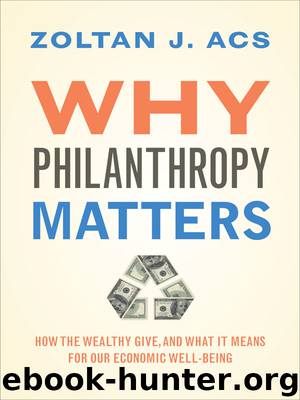Why Philanthropy Matters by Acs Zoltan J

Author:Acs, Zoltan J.
Language: eng
Format: epub
Publisher: Princeton University Press
Published: 2013-03-14T16:00:00+00:00
The Giving Pledge
Bill Gates was the richest man in the world when his mother convinced him to devote himself to philanthropy. Gates and his wife founded the Bill and Melinda Gates Foundation, the largest philanthropic foundation in the United States, which they endowed with twenty-two billion dollars. Their foundation is about four times as large, in constant dollars, as those of Carnegie and Rockefeller. The Gates Foundation’s giving has included, among other grants, one hundred million dollars to fight childhood disease in developing countries and two hundred million dollars to buy computers for libraries.4 The focus of the Gates Foundation, which will give away one billion dollars each year, includes education and health issues both in the United States and in the developing world. Warren Buffett merged his fortune into the Gates Foundation, which helped make it the largest philanthropic foundation in the world at thirty-two billion dollars.
The Giving Pledge, an idea put forth by Bill Gates and Warren Buffett, commits billionaires to give away one-half of their wealth in their lifetimes. In the summer of 2010, forty billionaires signed the pledge. As of mid-2012, a total of eighty-one billionaires have signed on.5 The signatories of the Giving Pledge are almost all self-made billionaires, with the exception of Barron Hilton and David Rockefeller. That’s seventy-nine entrepreneur-philanthropists to two inheritor-philanthropists. This is a huge commitment from a large number of billionaires; of the four hundred billionaires in the United States, approximately one-fifth have signed the Giving Pledge, and many of those who have not signed have individually given away billions.
Why do individuals give? In his so-called Gospel of Wealth, Andrew Carnegie wrote that the reason he gave his money away was because it was the duty of the man of wealth “to set an example of modest, unostentatious living, shunning display or extravagance; to provide moderately for the legitimate wants of those dependent upon him; and after doing so, to consider all surplus revenues which come to him simply as trust funds.… the man of wealth thus becoming the mere trustee and agent for his poorer brethren.”6 The letters that accompany the Giving Pledge represent a twenty-first-century Gospel of Wealth, giving a rare collective insight into the workings of and motivations behind American philanthropy. In order to understand why philanthropy is so strong in the United States, it is worth considering some of the attitudes revealed in the letters.
The motivations for giving all reflect overarching bourgeois, or middle-class, values, though three distinct themes emerge: wanting to make a difference in the lives of future generations; recognizing that luck and community play large roles in good fortune, and therefore wanting to give back; and feeling that enormous wealth should not be left to family.
None of the signatories directly invoke the promotion of social order as a reason for giving, as Carnegie did in his Gospel of Wealth. Rather, today’s philanthropists usually speak, instead, of their duty to “give something back” to the society that helped make their own success possible. Why do rich people care about opportunity? Those with modest upbringings do because of their values.
Download
This site does not store any files on its server. We only index and link to content provided by other sites. Please contact the content providers to delete copyright contents if any and email us, we'll remove relevant links or contents immediately.
The Secret History by Donna Tartt(16622)
The Social Justice Warrior Handbook by Lisa De Pasquale(11489)
Thirteen Reasons Why by Jay Asher(7788)
This Is How You Lose Her by Junot Diaz(5771)
Weapons of Math Destruction by Cathy O'Neil(5036)
Zero to One by Peter Thiel(4824)
The Myth of the Strong Leader by Archie Brown(4789)
Promise Me, Dad by Joe Biden(4447)
Beartown by Fredrik Backman(4415)
Stone's Rules by Roger Stone(4415)
How Democracies Die by Steven Levitsky & Daniel Ziblatt(4398)
The Fire Next Time by James Baldwin(4342)
100 Deadly Skills by Clint Emerson(4076)
A Higher Loyalty: Truth, Lies, and Leadership by James Comey(4032)
Rise and Kill First by Ronen Bergman(4012)
The David Icke Guide to the Global Conspiracy (and how to end it) by David Icke(3881)
The Farm by Tom Rob Smith(3872)
Secrecy World by Jake Bernstein(3782)
The Doomsday Machine by Daniel Ellsberg(3730)
